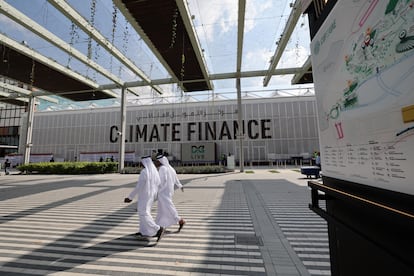Nine key facts about the climate summit: Why is COP28 being held in Dubai?
The first assessment of the application of the Paris Agreement will be carried out at the conference, and it is expected to show that signatory countries’ climate plans are still not enough


The United Arab Emirates (UAE) is hosting the annual climate summit, known as COP28, from November 30 to December 12 (in principle, because the end of these conferences is always delayed). These are the key points of the event, held in Dubai and organized under the umbrella of the United Nations. The summit will put fossil fuels in the spotlight since it is being hosted by one of the main oil and gas producing nations, and because it is expected that there will be a call to abandon this source of energy.
1. What is a COP?
The acronym COP refers to the Conference of the Parties. That is, the — usually annual — meeting of the almost 200 countries that are part of the United Nations Framework Convention on Climate Change. The convention was adopted in 1992 and established that the greenhouse gases emitted by human activity are responsible for climate change. The convention also established that the signatories must reduce these gases. COPs are held to develop this treaty, with delegates and ministers from almost 200 countries in the world participating. The first COP was in Berlin in 1995 and the one that starts today in Dubai is number 28.
2. Why is the COP being held in an oil-producing country?
Every country in the world participates in climate negotiations, from the largest to the smallest. This includes those whose economy depends on fossil fuels, as is the case of the UAE (29% of its income is linked to oil and gas). Each year the summit is held in a particular region, and in 2023 it was Asia’s turn. The United Arab Emirates applied and the countries in the region accepted. Then, the other the nations participating in the climate talks also accepted the application. Many environmental groups have criticized the president of this summit, Sultan al Jaber. In addition to being the Minister of Energy, he is the advisor delegate of ADNOC (Abu Dhabi National Oil Company), the eighth-largest oil company in the world.
3. What is the Paris Agreement?
The framework convention served to approve the Kyoto Protocol in 1997. Then, in 2015, the Paris Agreement was adopted, which obliges all countries that join the pact to commit to cutting greenhouse gas emissions. The sum of all these reductions must be enough to meet the main objective: the average temperature of the planet at the end of the century must not exceed two degrees Celsius with respect to pre-industrial levels and, as much as possible, not exceed 1.5. That is the limit that science has established to avoid irreversible and catastrophic effects that this would have. The planet has already warmed by about 1.2 degrees.
4. Is the world on track to comply with the Paris Agreement?
No. Scientific studies — led by the IPCC, the group of experts that advises the United Nations — and different organizations linked to the U.N. warn that many countries are not on track to meet those Paris goals. Although progress has been made since the signing of the Paris Agreement in 2015, current plans will lead to a temperature increase of between 2.1 and 2.8 degrees because the cuts in greenhouse gases have not been deep enough. The concentration of these gases in the atmosphere has continued to increase, and in 2022 they set a record once again. This has already caused damage that will be “irreversible” for “centuries or millennia” and will lead to an increase in the intensity and frequency of extreme weather events, as the IPCC has established in its latest major review of climate science. This study warns that climate change is “a threat to human well-being and the health of the planet,” and the “window of opportunity” that humanity has to ensure “a habitable and sustainable future for all” is “rapidly closing.” This means that with each year that passes without emissions falling significantly, it will be much more difficult to meet the 1.5 degree goal.
5. What are NDCs?
The Nationally Determined Contributions, or NDCs in climate negotiations jargon, are the plans to cut emissions that the signatory nations of the Paris Agreement committed to implement. The current NDC proposes cuts until 2030. But they are insufficient. They will lead to warming of between 2.1 and 2.8 degrees. At COP28, the first official assessment of the efforts since the Paris Agreement entered into force must be carried out. Knowing where climate plans are at should serve, among other things, to prepare the next round of national plans. The new NDCs will be presented in 2025 and will cover the period up to 2035. And what the most ambitious countries are looking for in the fight against climate change is for the assessment to establish the measures that must be adopted so that warming remains within the current safety limits.
6. Why are fossil fuels in the spotlight?
Coal, oil, and gas are mainly responsible for climate change, since they are the largest source of greenhouse gases. That is why scientists have established that the world must get rid of these fuels. The main alternative is renewables. And a mandate is expected to emerge from COP28 to triple renewable power in the world, which means going from 3,400 gigawatts (GW) in 2022 to around 11,000 in 2030. But it is still not enough to triple output from renewables. Efficiency rates need to be doubled — the world needs to consume less energy — and most importantly of all, a clear path to abandoning all fossil fuels must be outlined. Getting a robust call for this abandonment, which could be included in the assessment, would be a signal for nations to include it in their climate plans too.
7. What are carbon capture and offsets?
For most experts, these are a residual solution that should only be used only in processes, such as industrial processes, in which there is almost no alternative to eliminating mainly carbon dioxide emissions. For the fossil fuel industry it is a back door that allows them to continue extracting and selling coal, oil, and gas. Capture and storage, an expensive and rarely used technique, consists of capturing a facility’s emissions and holding on to them so that they do not end up in the atmosphere. Added to this is offsetting emissions with methods such as planting forests. In both cases the problem is not attacked at its roots. In climate jargon, when we talk about “unabated” fossil fuel elimination, we are leaving that uncertain door open to capture and storage.
8. Who are the main emitters of greenhouse gases?
According to official U.N. data, in 2021 China was the main emitter of greenhouse gases, with 30% of the world total. They are followed at a great distance by the US (11%), India (7%), the EU (7%) and Russia (5%). But if we look at historical responsibilities, the picture changes somewhat. If all emissions accumulated between 1850 and 2021 are taken as a reference, the United States is the first, with 17%. They are followed in this ranking by China (12%), the EU (10%), Russia (6%) and India (5%).
9. What else can we expect from the Dubai summit?
It is clear that responsibility for the climate crisis must be sought in the G20. Paradoxically, the countries most at risk from climate change are not members of the group of the world’s 20 largest economies. Many of the most vulnerable countries are those that are least responsible for this crisis and also have the least capacity to deal with its effects. At the previous summit, held in the Egyptian city of Sharm el Sheik, a commitment was made to create a loss and damage fund to compensate the most vulnerable countries. This fund, to which not only developed countries are expected to contribute, should be one of the Dubai summit’s outcomes.
Sign up for our weekly newsletter to get more English-language news coverage from EL PAÍS USA Edition
Tu suscripción se está usando en otro dispositivo
¿Quieres añadir otro usuario a tu suscripción?
Si continúas leyendo en este dispositivo, no se podrá leer en el otro.
FlechaTu suscripción se está usando en otro dispositivo y solo puedes acceder a EL PAÍS desde un dispositivo a la vez.
Si quieres compartir tu cuenta, cambia tu suscripción a la modalidad Premium, así podrás añadir otro usuario. Cada uno accederá con su propia cuenta de email, lo que os permitirá personalizar vuestra experiencia en EL PAÍS.
¿Tienes una suscripción de empresa? Accede aquí para contratar más cuentas.
En el caso de no saber quién está usando tu cuenta, te recomendamos cambiar tu contraseña aquí.
Si decides continuar compartiendo tu cuenta, este mensaje se mostrará en tu dispositivo y en el de la otra persona que está usando tu cuenta de forma indefinida, afectando a tu experiencia de lectura. Puedes consultar aquí los términos y condiciones de la suscripción digital.








































